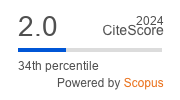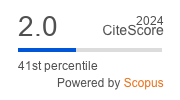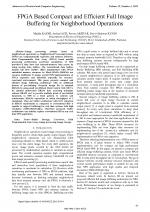| 1/2015 - 14 |
FPGA Based Compact and Efficient Full Image Buffering for Neighborhood OperationsKAZMI, M. |
| Extra paper information in |
| Click to see author's profile in |
| Download PDF |
Author keywords
buffer storage, convolver, field programmable gate array, image processing, image storage
References keywords
processing(15), fpga(13), systems(11), image(11), time(10), real(10), implementation(7), design(7), vision(6), hardware(6)
Blue keywords are present in both the references section and the paper title.
About this article
Date of Publication: 2015-02-28
Volume 15, Issue 1, Year 2015, On page(s): 95 - 104
ISSN: 1582-7445, e-ISSN: 1844-7600
Digital Object Identifier: 10.4316/AECE.2015.01014
Web of Science Accession Number: 000352158600014
SCOPUS ID: 84924812669
Abstract
Image processing systems based on neighborhood operations i.e. Neighborhood Processing Systems (NPSs) are computationally expensive and memory intensive. Field Programmable Gate Array (FPGA) based parallel processing architectures accelerate calculations of NPS provided if they have fast external-memory data access by using on-chip data buffers. The conventional data buffers namely full Row Buffers (RBs) implemented with FPGA embedded memory resources i.e. Block RAMs (BRAMs) are resource inefficient. It makes overall NPS implementation on FPGA expensive and infeasible especially for resource-constraint environment. This paper presents compact and efficient image buffering architecture with an additional feature of pre-fetching. Proposed design fits in minimal BRAMs by using small yet efficient Main Control Unit (MCU). Its optimal multi-rated BRAM data accessing technique reduces BRAM cost to provide multiple pixels of pre-fetched data/clock to NPS in a fixed pattern. It controls and synchronizes BRAMs operations to attain throughput of 1 clock/pixel. Thus our buffer architecture with 66% reduction in BRAM requirement as compared to conventional RBs is capable to support buffering for real time systems with high resolution (1080x1920@62fps). Therefore proposed buffer architecture can suitably replace conventional RB in any real time NPS application. |
| References | | | Cited By «-- Click to see who has cited this paper |
| [1] C. T. Huitzil, M. A. Estrada, "Real-time image processing with a compact FPGA-based systolic architecture," Real-Time Imaging, vol. 10, no. 3, pp. 177-187, June. 2004, [CrossRef]
[Web of Science Times Cited 28] [SCOPUS Times Cited 46] [2] H. Zhang, M. Xia, G. Hu, "A Multiwindow Partial Buffering Scheme for FPGA-Based 2-D Convolvers," Circuits and Systems II: Express Briefs, IEEE Transactions on, vol.54, no.2, pp.200-204, Feb. 2007, [CrossRef] [Web of Science Times Cited 44] [SCOPUS Times Cited 55] [3] Q. Liu, G.A. Constantinides,K. Masselos, P. Cheung, "Combining Data Reuse With Data-Level Parallelization for FPGA-Targeted Hardware Compilation: A Geometric Programming Framework," Computer-Aided Design of Integrated Circuits and Systems, IEEE Transactions on , vol.28, no.3, pp.305-315, March 2009, [CrossRef] [Web of Science Times Cited 24] [SCOPUS Times Cited 19] [4] D. G. Bailey, "Design for embedded image processing on FPGAs", pp. 116, 233, John Wiley & Sons, 2011. [5] B. Bosi, G. Bois, Y. Savaria, "Reconfigurable pipelined 2-D convolvers for fast digital signal processing," Very Large Scale Integration (VLSI) Systems, IEEE Transactions on , vol.7, no.3, pp.299-308, Sept. 1999, [CrossRef] [Web of Science Times Cited 115] [SCOPUS Times Cited 139] [6] X. Liang, J. Jean, K. Tomko, "Data buffering and allocation in mapping generalized template matching on reconfigurable systems," The Journal of Supercomputing, vol. 19, no. 1, pp. 77-91, 2001, [CrossRef] [Web of Science Times Cited 25] [SCOPUS Times Cited 29] [7] K. Wiatr, E. Jamro, "Implementation image data convolutions operations in FPGA reconfigurable structures for real-time vision systems," Information Technology: Coding and Computing, 2000. Proceedings. International Conference on, pp.152-157, 2000, [CrossRef] [SCOPUS Times Cited 19] [8] F. C. Tormo, P. L. Molinet, "Area-efficient 2-D shift-variant convolvers for FPGA-based digital image processing," Circuits and Systems II: Express Briefs, IEEE Transactions on, vol.53, no.2, pp.105-109, Feb. 2006, [CrossRef] [Web of Science Times Cited 25] [SCOPUS Times Cited 36] [9] T. P. Cao, D. Elton, G. Deng, "Fast buffering for FPGA implementation of vision-based object recognition systems," Journal of Real-Time Image Processing, vol. 7, no. 3, pp. 173-183, 2012, [CrossRef] [Web of Science Times Cited 14] [SCOPUS Times Cited 15] [10] M. Schmidt, M. Reichenbach, A. Loos, D. Fey, " A smart camera processing pipeline for image applications utilizing Marching Pixels," Signal & Image Processing: An International Journal (SIPIJ), vol. 2, no. 3, pp. 137-156, 2011. [11] C. T. Moore, H. Devos, D. Stroobandt, " Optimizing the FPGA memory design for a sobel edge detector," in 20th Annual Workshop on Circuits, Systems and Signal Processing (ProRISC 2009), STW Technology Foundation, 2009, [Handle] [12] C. L. Sotiropoulou, L. Voudouris, C. Gentsos, A. M. Demiris, N. Vassiliadis, S. Nikolaidis, "Real-Time Machine Vision FPGA Implementation for Microfluidic Monitoring on Lab-on-Chips," Biomedical Circuits and Systems, IEEE Transactions on , vol.8, no.2, pp.268-277, April 2014, [CrossRef] [Web of Science Times Cited 16] [SCOPUS Times Cited 17] [13] D. Koukounis, C. Ttofis, A. Papadopoulos, T. Theocharides, "A high performance hardware architecture for portable, low-power retinal vessel segmentation," Integration, the VLSI Journal, vol. 47, no. 3, pp. 377-386, June. 2014, [CrossRef] [Web of Science Times Cited 22] [SCOPUS Times Cited 29] [14] D. Koukounis, C. Tttofis, T. Theocharides,"Hardware acceleration of retinal blood vasculature segmentation," In Proceedings of the 23rd ACM international conference on Great lakes symposium on VLSI (GLSVLSI '13), ACM, New York, NY, USA,pp. 113-118, 2013, [CrossRef] [SCOPUS Times Cited 7] [15] T. R. Savarimuthu, A. Kjær-Nielsen, A.S. Sørensen," Real-time medical video processing, enabled by hardware accelerated correlations," Journal of Real-Time Image Processing, vol. 6, no. 3, pp. 187-197, 2011, [CrossRef] [Web of Science Times Cited 16] [SCOPUS Times Cited 21] [16] R. M. Gibson, A. Ahmadinia, S.G. McMeekin, N.C. Strang, G. Morison, "A reconfigurable real-time morphological system for augmented vision," EURASIP Journal on Advances in Signal Processing, vol. 1, pp. 1-13, 2013, [CrossRef] [Web of Science Times Cited 18] [17] M. Imran, K. Khursheed, N. Ahmad, M. O'Nils, N. Lawal, M. A. Waheed, "Complexity Analysis of Vision Functions for Comparison of Wireless Smart Cameras," International Journal of Distributed Sensor Networks, vol. 2014, Article ID 710685, 15 pages, 2014, [CrossRef] [Web of Science Times Cited 2] [SCOPUS Times Cited 6] [18] S. Jin, J. Cho, X. D. Pham, K. M. Lee, S. K. Park, M. Kim, J. W. Jeon, "FPGA Design and Implementation of a Real-Time Stereo Vision System," Circuits and Systems for Video Technology, IEEE Transactions on, vol.20, no.1, pp.15-26, Jan. 2010, [CrossRef] [Web of Science Times Cited 221] [SCOPUS Times Cited 287] [19] 7 Series FPGAs Memory Resources, User Guide, v1.10 .1, May2014, [Online] Available: Temporary on-line reference link removed - see the PDF document [20] D. G. Bailey, "Efficient implementation of greyscale morphological filters," Field-Programmable Technology (FPT), 2010 International Conference on, pp.421-424, 8-10 Dec. 2010, [CrossRef] [SCOPUS Times Cited 7] [21] Virtex-5 FPGA, User Guide, v5.4, 2012, [Online] Available: Temporary on-line reference link removed - see the PDF document [22] S. Singh, A.K. Saini, R. Saini, A. S. Mandal, C. Shekhar, A. Vohra,"A Novel Real-time Resource Efficient Implementation of Sobel Operator based Edge Detection on FPGA,". International Journal of Electronics, pp. 1-11, 2014, [CrossRef] [Web of Science Times Cited 15] [SCOPUS Times Cited 22] [23] F.C. Tormo, P.L. Molinet, "Area-efficient 2-D shift-variant convolvers for FPGA-based digital image processing," Signal Processing Systems Design and Implementation, 2005. IEEE Workshop on, pp.209-213, 2-4 Nov. 2005, [CrossRef] [Web of Science Times Cited 9] [SCOPUS Times Cited 13] [24] S. Singh, S. Saurav, R. Saini, A .K. Saini, C. Shekhar, A. Vohra, "Comprehensive Review and Comparative Analysis of Hardware Architectures for Sobel Edge Detector," ISRN Electronics, vol. 2014, Article ID 857912, 9 pages, 2014, [CrossRef] [25] P. Turcza, M. Duplaga, "Hardware-Efficient Low-Power Image Processing System for Wireless Capsule Endoscopy," Biomedical and Health Informatics, IEEE Journal of , vol.17, no.6, pp.1046-1056, Nov. 2013, [CrossRef] [Web of Science Times Cited 44] [SCOPUS Times Cited 61] [26] Logi CORE IP Block Memory Generator, Xilinx, v7.3. 2012, [Online] Available: Temporary on-line reference link removed - see the PDF document [27] D. Chen, J. Cong, P. Pan, "FPGA Design Automation: A Survey," Found. Trends Electron. Des. Autom, vol. 1, no. 3, pp, 139-169, January. 2006, [CrossRef] [Web of Science Times Cited 44] [SCOPUS Times Cited 82] [28] N. P. Sedcole, "Reconfigurable platform-based design in FPGAs for video image processing." PhD diss., University of London, 2006. Web of Science® Citations for all references: 682 TCR SCOPUS® Citations for all references: 910 TCR Web of Science® Average Citations per reference: 24 ACR SCOPUS® Average Citations per reference: 31 ACR TCR = Total Citations for References / ACR = Average Citations per Reference We introduced in 2010 - for the first time in scientific publishing, the term "References Weight", as a quantitative indication of the quality ... Read more Citations for references updated on 2025-06-03 15:27 in 169 seconds. Note1: Web of Science® is a registered trademark of Clarivate Analytics. Note2: SCOPUS® is a registered trademark of Elsevier B.V. Disclaimer: All queries to the respective databases were made by using the DOI record of every reference (where available). Due to technical problems beyond our control, the information is not always accurate. Please use the CrossRef link to visit the respective publisher site. |
Faculty of Electrical Engineering and Computer Science
Stefan cel Mare University of Suceava, Romania
All rights reserved: Advances in Electrical and Computer Engineering is a registered trademark of the Stefan cel Mare University of Suceava. No part of this publication may be reproduced, stored in a retrieval system, photocopied, recorded or archived, without the written permission from the Editor. When authors submit their papers for publication, they agree that the copyright for their article be transferred to the Faculty of Electrical Engineering and Computer Science, Stefan cel Mare University of Suceava, Romania, if and only if the articles are accepted for publication. The copyright covers the exclusive rights to reproduce and distribute the article, including reprints and translations.
Permission for other use: The copyright owner's consent does not extend to copying for general distribution, for promotion, for creating new works, or for resale. Specific written permission must be obtained from the Editor for such copying. Direct linking to files hosted on this website is strictly prohibited.
Disclaimer: Whilst every effort is made by the publishers and editorial board to see that no inaccurate or misleading data, opinions or statements appear in this journal, they wish to make it clear that all information and opinions formulated in the articles, as well as linguistic accuracy, are the sole responsibility of the author.



